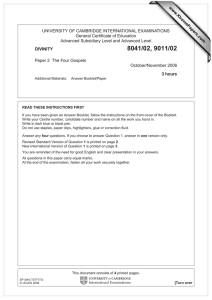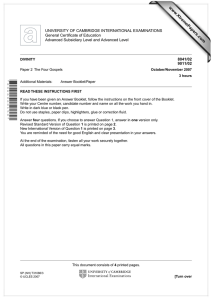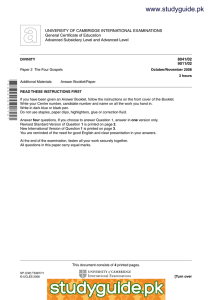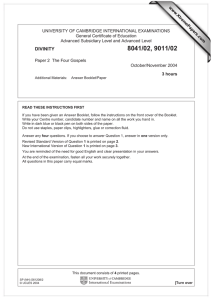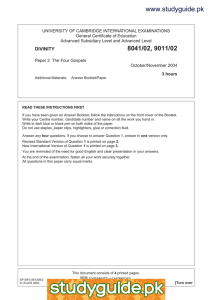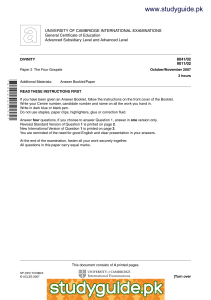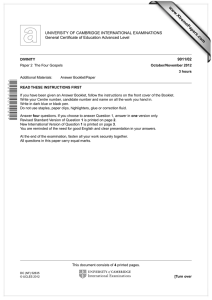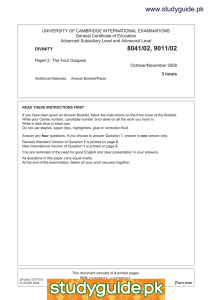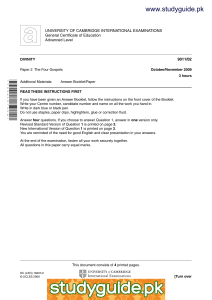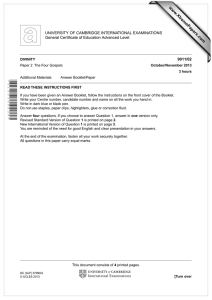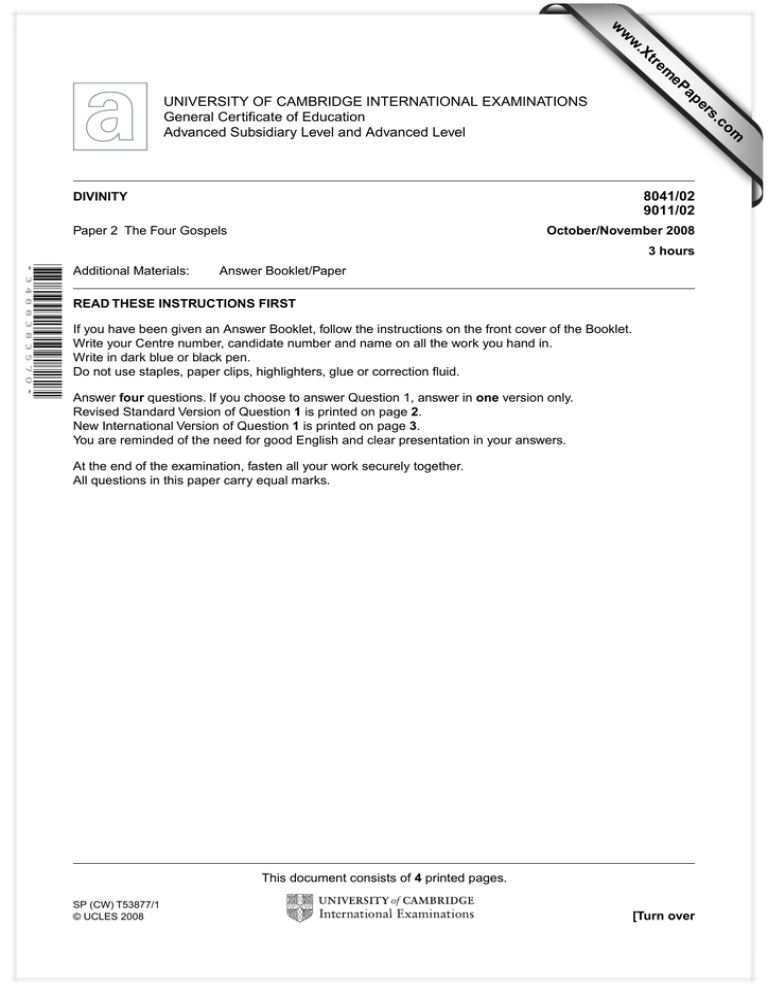
w
w
ap
eP
m
e
tr
.X
w
om
.c
s
er
UNIVERSITY OF CAMBRIDGE INTERNATIONAL EXAMINATIONS
General Certificate of Education
Advanced Subsidiary Level and Advanced Level
8041/02
9011/02
DIVINITY
Paper 2 The Four Gospels
October/November 2008
3 hours
*3488383570*
Additional Materials:
Answer Booklet/Paper
READ THESE INSTRUCTIONS FIRST
If you have been given an Answer Booklet, follow the instructions on the front cover of the Booklet.
Write your Centre number, candidate number and name on all the work you hand in.
Write in dark blue or black pen.
Do not use staples, paper clips, highlighters, glue or correction fluid.
Answer four questions. If you choose to answer Question 1, answer in one version only.
Revised Standard Version of Question 1 is printed on page 2.
New International Version of Question 1 is printed on page 3.
You are reminded of the need for good English and clear presentation in your answers.
At the end of the examination, fasten all your work securely together.
All questions in this paper carry equal marks.
This document consists of 4 printed pages.
SP (CW) T53877/1
© UCLES 2008
[Turn over
2
REVISED STANDARD VERSION
1
Comment on points of interest or difficulty in four of the following passages (wherever possible
answers should refer to the context of the passage but should not retell the story from which the
passage is taken):
(a) “Woe to you, scribes and Pharisees, hypocrites! for you tithe mint and dill and cummin, and
have neglected the weightier matters of the law, justice and mercy and faith; these you ought
to have done, without neglecting the others.”
(Matthew 23:23)
(b) So when Pilate saw that he was gaining nothing, but rather that a riot was beginning, he took
water and washed his hands before the crowd, saying, “I am innocent of this man’s blood; see
to it yourselves.”
(Matthew 27:24)
(c) “Is not this the carpenter, the son of Mary and brother of James and Joses and Judas and
Simon, and are not his sisters here with us?” And they took offence at him.
(Mark 6:3)
(d) For the Son of man also came not to be served but to serve, and to give his life as a ransom
for many.
(Mark 10:45)
(e) And Jesus answered him, “It is said, ‘You shall not tempt the Lord your God.’ ” And when the
devil had ended every temptation, he departed from him until an opportune time.
(Luke 4:12-13)
(f)
When the messengers of John had gone, he began to speak to the crowds concerning John:
“What did you go out into the wilderness to behold? A reed shaken by the wind?” (Luke 7:24)
(g) And Jesus said to her, “O woman, what have you to do with me? My hour has not yet come.”
(John 2:4)
(h) And when he comes, he will convince the world concerning sin and righteousness and
judgment.
(John 16:8)
© UCLES 2008
9011/02/O/N/08
3
NEW INTERNATIONAL VERSION
1
Comment on points of interest or difficulty in four of the following passages (wherever possible
answers should refer to the context of the passage but should not retell the story from which the
passage is taken):
(a) “Woe to you, teachers of the law and Pharisees, you hypocrites! You give a tenth of your
spices—mint, dill and cummin. But you have neglected the more important matters of the
law—justice, mercy and faithfulness. You should have practised the latter, without neglecting
the former.”
(Matthew 23:23)
(b) When Pilate saw that he was getting nowhere, but that instead an uproar was starting, he
took water and washed his hands in front of the crowd. “I am innocent of this man’s blood,” he
said. “It is your responsibility!”
(Matthew 27:24)
(c) “Isn’t this the carpenter? Isn’t this Mary’s son and the brother of James, Joseph, Judas and
Simon? Aren’t his sisters here with us?” And they took offence at him.
(Mark 6:3)
(d) For even the Son of Man did not come to be served, but to serve, and to give his life as a
ransom for many.
(Mark 10:45)
(e) Jesus answered, “It says: ‘Do not put the Lord your God to the test.’ ” When the devil had
finished all this tempting, he left him until an opportune time.
(Luke 4:12-13)
(f)
After John’s messengers left, Jesus began to speak to the crowd about John: “What did you
go out into the desert to see? A reed swayed by the wind?”
(Luke 7:24)
(g) “Dear woman, why do you involve me?” Jesus replied, “My time has not yet come.” (John 2:4)
(h) When he comes, he will convict the world of guilt in regard to sin and righteousness and
judgment.
(John 16:8)
© UCLES 2008
9011/02/O/N/08
[Turn over
4
2
To what extent and for what reasons did Matthew write his gospel around passages from the Old
Testament?
3
“Matthew presents Jesus as a teaching Messiah.” Discuss.
4
Explain why the Gospel of Mark is sometimes called the ‘Gospel of Peter’.
5
Examine the teaching in the Gospel of Mark about the kingdom of God.
6
“The song of Mary, the song of Zechariah and the song of Simeon all set the scene for what is to
follow later in Luke’s gospel.” Discuss.
7
Explain the important features of Luke’s account of the resurrection and post-resurrection
appearances of Jesus.
8
Examine the significance of the first chapter of John, for the way he presents Jesus in the rest of
his gospel.
9
Discuss the teaching of the so-called ‘Farewell Discourses’ found in John 14-17.
10 Discuss the teaching of Jesus on repentance and forgiveness.
11 Describe and analyse the teaching of Jesus on discipleship and commitment.
12 Why did Jesus use parables?
13 Explain the difficulties of interpreting the ethical teaching of Jesus.
14 Assess the proposed solutions to the synoptic problem.
Copyright Acknowledgements:
Scripture quotations marked (RSV) are from the Revised Standard Version of the Bible, copyright © 1946, 1952 and 1971 by the Division of Christian Education
of the National Council of the Churches of Christ in the USA. Used by permission. All rights reserved.
Scripture quotations marked (NIV) are taken from the Holy Bible, New International Version®. NIV®. Copyright © 1973, 1978, 1984 by International Bible Society.
Used by permission. All rights reserved.
Permission to reproduce items where third-party owned material protected by copyright is included has been sought and cleared where possible. Every reasonable
effort has been made by the publisher (UCLES) to trace copyright holders, but if any items requiring clearance have unwittingly been included, the publisher will
be pleased to make amends at the earliest possible opportunity.
University of Cambridge International Examinations is part of the Cambridge Assessment Group. Cambridge Assessment is the brand name of University of
Cambridge Local Examinations Syndicate (UCLES), which is itself a department of the University of Cambridge.
© UCLES 2008
9011/02/O/N/08


